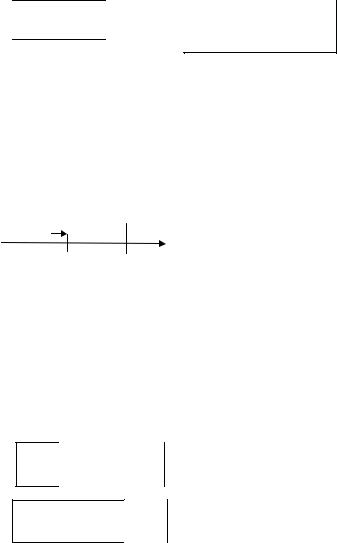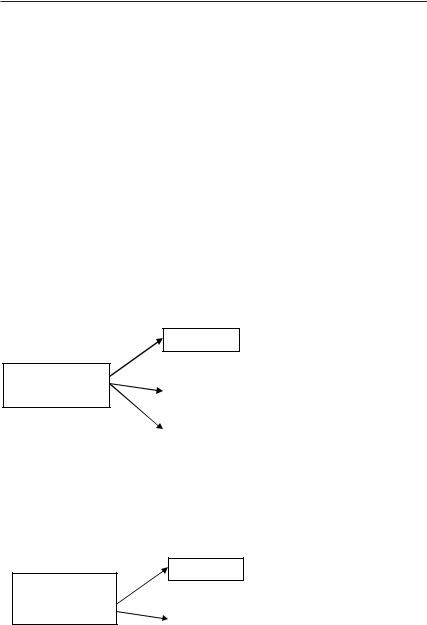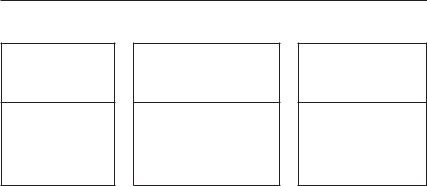
English_for_Lawyers_2011
.pdf
|
GRAMMAR GUIDE |
|
|
|
|
1) завершенадія: |
I have already discussed |
|
2) дія, що почалася в минулому |
the matter. |
|
She has changed a lot |
||
та має результат на момент мовлення: |
||
|
since last year. |
• |
I/we/you/they |
have |
||
He/she/it |
|
has |
||
|
|
|
|
|
? |
have |
|
I/we/you/they |
|
|
has |
|
He/she/it |
|
discussed (verb+ed or
Past Participle of the he matter. irregular verb)
discussed the matter?
– |
I/we/you/they |
|
not discussed the matter. |
have |
|||
|
He/she/it |
has |
|
|
|
|
|
The Past Perfect
Індикатори часу: by, by the time, after
Минула дія, що була завершена до іншої дії
або до певного моменту в минулому: He had discussed the matter by the time I got there.
• |
I/we/you/they |
had |
discussed (verb+ed or PII |
the matter by the |
He/she/it |
|
of the irregular verb) |
||
|
|
time I got there. |
||
|
|
|
|
|
|
|
|
|
? had I/we/you/they He/she/it
–I/we/you/they had He/she/it
discussed the matter by the time I got there?
not discussed the matter by the time I got there.
561

GRAMMAR GUIDE
The Future Perfect
|
|
Індикатори часу: by, by the time, by then, before |
|
||||||
|
|
Дія, яка буде завершена до певного He will have discussed the matter |
|||||||
моменту в майбутньому: |
by 8 p.m. tomorrow. |
||||||||
|
|
|
|
|
|
|
|
|
|
• |
|
I/we/you/they |
|
will have |
discussed (verb+ed or PII |
the matter by 8 |
|||
|
|
He/she/it |
|
|
|
|
of the irregular verb) |
p.m. tomorrow. |
|
|
|
|
|
|
|
|
|
|
|
|
|
|
|
|
|
|
|
|
|
? |
|
Wil |
I/we/you/they |
|
have discussed the matter by 8 p.m. tomorrow? |
||||
|
l |
He/she/it |
|
|
|||||
_ |
|
|
|
|
|
not have discussed the matter by |
|||
|
|
|
|||||||
|
I/we/you/they |
will |
|||||||
|
|
He/she/it |
|
|
8 p.m. tomorrow. |
|
|||
PERFECT CONTINUOUS TENSE
Perfect Continuous Tenses означаєдію, початокякоївідбувається до моменту мовлення, і в момент мовлення дія або ще не закінчується, абозакінченабезпосередньопередмоментоммовлення. Якщодія все ще триває в момент мовлення, то обовязковим є зазначення періодутриваннядії. Можутьуживатися індикаторичасу: since 5 o’clock, for a month, for a long time, by the 23rd of June 2004. Наприклад:
I have been studying Criminology for a few years.
I had been studying Criminology for two hours when you came home. I will have been studying Criminology for two years by the end of the
year.
The Present Perfect Continuous
Індикатори часу: already, since, for
562

|
|
|
|
|
|
|
|
GRAMMAR GUIDE |
|
|
|
|
|
|
|
|
|
|
Дія, що почалася в минулому та He has been discussing |
|||||||
|
продовжується на момент |
the matter for 2 hours. |
||||||
|
мовлення або закінчена |
|
||||||
|
безпосередньо перед моментом |
|||||||
|
мовлення: |
|
|
|
|
|
||
|
|
|
|
|
|
|
|
|
• |
I/we/you/they |
|
have been |
discussing the matter for 2 hours. |
||||
He/she/it |
|
|
has been |
|||||
|
|
|
|
|||||
|
|
|
|
|
|
|
|
|
|
|
|
|
|
|
|
|
|
? |
have |
|
I/we/you/they |
|
|
been discussing the matter for 2 hours? |
||
|
has |
|
He/she/it |
|
|
|
||
|
|
|
|
|
|
|||
– |
I/we/you/they |
|
have |
|
been not discussing the matter for 2 hours. |
|||
|
He/she/it |
|
|
has |
|
|
||
The Past Perfect Continuous
Індикатори часу: for the last two hours
Тривала дія, яка почалася до якогось моменту в минулому і або продовжувалась у цей момент, або закінчилась перед ним:
He had been discussing the matter for 2 hours already when her mother came.
|
|
|
|
|
|
|
|
|
|
the matter for 2 hours |
|
I/we/you/they |
|
had been |
discussing |
||||||
• |
|
already |
||||||||
|
He/she/it |
|
|
|
|
|
|
|
when the phone rang. |
|
? |
|
|
|
|
been discussing the matter for 2 hours already |
|||||
had |
I/we/you/they |
|
||||||||
|
|
He/she/it |
|
|
|
when the phone rang? |
||||
– |
|
|
|
|
|
not been discussing the matter for 2 hours |
||||
I/we/you/they |
|
had |
|
|
||||||
|
He/she/it |
|
|
|
|
|
when the phone rang. |
|||
|
|
|
|
|
|
|
|
|||
|
|
|
|
|
|
|
|
|
|
|
563

GRAMMAR GUIDE
THE PASSIVE VOICE
Якщо підмет означає особу чи предмет, який вчиняє дію, то дієслово використовується у формі активного стану: I wrote a letter. — Я написав лист.
Якщо підмет означає особу чи предмет, на який спрямована дія іншої особи чи предмета, то дієслово використовується у формі пасивного стану: A letter was written by me. — Лист був написаний мною.
Часи пасивного стану утворюються за допомогою допоміжного дієслова to be у відповідному часі та числі і форми дієприкметника минулого часу (The Past Participle) смислового дієслова, яка не змінюється залежно від часу або числа: A letter is/ was/ will be written by me. — Лист написаний/ був написаний/ буде написаний мною.
Simple
I, we, you, they He, she, it
Continuous
I, we, you, they He, she, it
Present
am, are, is
Past |
|
|
|
+ |
asked |
||
was |
(verb+ed or Past |
||
were |
|
Participle of the |
|
|
|
|
irregular verb) |
Future |
|
||
|
|
||
|
|
|
|
will be |
|
|
|
|
|
|
|
Present
am, are, is
Past |
|
|
+ |
being asked |
|
was |
(verb+ed or Past |
|
were |
|
Participle of the |
|
|
irregular verb) |
|
|
564

GRAMMAR GUIDE
Perfect
Present
|
|
have, has |
|
|
||
I, we, you, they |
|
Past |
|
|
||
He, she, it |
|
|
|
|||
|
+ |
been asked |
||||
|
|
|
|
|
||
|
|
had |
|
|
(verb+ed or Past |
|
|
|
|
|
|
|
Participle of the |
|
|
Future |
|
|
|
irregular verb) |
|
|
|
|
|
|
|
|
|
will have |
|
|
|
|
|
|
|
|
|
||
|
|
|
|
|
|
|
MODAL VERBS
(with Simple Infinitive)
Дієсловаcan, may, must, have to, need, should, ought to належатьдо групи модальних дієслів (Modal Verbs). Модальні дієслова не використовуються самостійно, а лише у сполученні з інфінітивом смислового дієслова. У цьому сполученні смислове дієслово виражає безпосередю дію, а модальне дієслово, залежно від його значення, може означати можливість, дозвіл, забов’язаність, необхідність, моральний обов’язок, рекомендацію щодо здійсненя цієї дії. Інфінітив, який ставиться після модального дієслова, втрачає частку to, за ви-
нятком have to та ought to: I can go there. — Я можу піти туди. — I have to go there. — Я маю піти туди. — I ought to go there. — Я маю піти (морально забов’язаний) піти туди.
Модальні дієслова мають особливі форми минулого та майбутнього часу (див. таблицю); вони не змінюються ні за особами, ні за числами (в 3-й особі однини теперешнього часу не мають закінчення -s).
Питальнітазаперечніреченнязмодальнимидієсловамиутворюються без використання допоміжних дієслів (виключення — have to:
Have you got to go there? = Do you have to go there?). У питанні мо-
дальне дієслово ставиться перед підметом: I can help you. — Can I help you?; у заперечному реченні заперечна частка not ставиться після модального дієслова: You must not smoke here. Зазвичай модальне дієслово у сполученні із заперечною часткою набувають скороченої форми: must not — mustn’t, need not — needn’t.
565

GRAMMAR GUIDE
Дієслово |
Значення |
Present |
Past |
Future |
|
|
|
|
|
|
|
|
|
can |
|
|
|
|
Можливість |
I can |
could |
will/ shall be able to |
|
can |
дії (здатність |
swim |
I could swim |
I’ll be able |
|
|
розумова чи |
well. |
even when |
to go to Kiev |
|
|
фізична) |
I can do |
I was 6. |
in October. |
|
|
|
it for you. |
|
|
|
|
Дозвіл |
|
might |
will/ shall |
|
|
(можливість |
|
be allowed to |
||
|
may |
He said Jim |
|||
may |
виконання |
I shall be |
|||
You may |
might take the |
||||
|
якоїсь дії |
take it. |
document. |
allowed to see |
|
|
з дозволу |
the document |
|||
|
|
was allowed to |
|||
|
кого-небудь) |
|
in an hour. |
||
|
|
|
|||
|
|
|
had to |
|
|
|
|
|
I had to |
|
|
|
|
|
put aside |
|
|
|
Обов’язок |
must |
my plans. |
|
|
|
(необхідність, |
|
|||
|
(повинен, |
You must |
яка обумовле- |
|
|
must |
зобов’язаний, |
tell the |
на обставина- |
will/ shall have to |
|
треба, |
truth! |
ми) |
I’ll have to help him |
||
|
необхідно). |
You |
was/were to |
||
|
with translation. |
||||
|
Заборона |
mustn’t |
I was to be at |
||
|
|
||||
|
(в заперечній |
smoke |
the meeting |
|
|
|
формі). |
here! |
at 5 sharp. |
|
|
|
|
|
(необхідність, |
|
|
|
|
|
яка обумовле- |
|
|
|
|
|
на розкладом, |
|
|
|
|
|
домовленістю) |
|
|
|
|
have/has |
|
|
|
|
Необхідність |
to |
had to |
will have to |
|
to have |
I have to |
Tomorrow |
|||
чи |
visit my |
Yesterday I had |
I’ll have to get up |
||
to |
обов’язковість |
to stay at home |
|||
aunt at |
early as my hus- |
||||
|
дії, зумовленої |
hospital |
as it was very |
band will come from |
|
|
обставинами |
every |
cold. |
abroad. |
|
|
|
day. |
|
|
566
|
|
|
|
GRAMMAR GUIDE |
|
|
|
|
|
|
|
|
|
|
Дієслово |
Значення |
Present |
Past |
Future |
|
|
|
|
|
|
|
need |
|
|
|
|
Need I go |
|
|
|
|
there? |
|
need |
|
Необхідність |
needn’t |
|
|
|
|
|
||
need |
виконання дії. |
You |
|
needn’t |
needn’t |
|
|||
needn’t |
Відсутність |
go to the |
|
She needn’t do this |
|
необхідності |
library, |
|
work; I’ll do it for |
|
|
I’ll give |
|
her. |
|
|
|
|
|
|
|
you this |
|
|
|
|
book. |
|
|
|
|
should |
|
|
|
|
As you |
|
|
|
|
feel ill |
|
|
|
|
you |
|
|
should |
Порада, |
should |
|
|
рекомендація |
go to the |
|
|
|
|
|
doctor. |
|
|
|
|
Why |
|
|
|
|
should |
|
|
|
|
I feel |
|
|
ought to |
Моральний |
guilty |
|
|
|
обов’язок |
about it? |
|
|
|
|
ought to |
|
|
|
|
You |
|
|
|
|
ought to |
|
|
|
|
help him. |
|
|
DIRECT AND INDIRECT SPEECH
Моваособи, переданасаметак, яквонабулапромовлена, називаєтьсяпрямоюмовою(Direct Speech). Упряміймовівикористовуютьсялапкитакома: He says, “I know these people”. — Вінкаже: „Язнаю цих людей”.
Моваособи, переданазазмістомувиглядідодатковогопідрядного речення, називається непрямою мовою (Indirect Speech). У непря-
міймовілапкитакомавідсутні: He says (that) he knows those people. —
Він каже, (що) він знає цих людей.
567

GRAMMAR GUIDE
При переведенні речення з прямою мовою в речення з непрямою мовоюформадієслова підрядного речення змінюється відповідно до форми дієслова головного речення:
Direct Speech |
Indirect Speech |
|
|
|
|
Present Simple |
Present Simple |
|
She says she lives in Kharkiv. |
||
“I live in Kharkiv”, she says. |
||
Present Continuous |
||
Present Continuous |
||
She says he is making a report. |
||
“He is making a report”, she says. |
||
|
||
Present Perfect |
Present Perfect |
|
“He has just left”, she says. |
||
She says he has just left. |
||
|
||
Present Simple |
Past Simple |
|
“I live in Kharkiv”, she said. |
She said she lived in Kharkiv. |
|
Present Continuous |
Past Continuous |
|
“He is making a report”, she said. |
She said he was making a report. |
|
Present Perfect |
Past Perfect |
|
“He has just left”, she said. |
She said he had just left. |
|
|
|
|
|
|
|
Past Simple |
Past Perfect |
|
“He left an hour ago”, she said. |
She said he had left an hour ago. |
|
Past Continuous |
Past Continuous |
|
“I was working when she rang me”, |
He said that he was working when she |
|
he said. |
rang him. |
|
Past Perfect |
Past Perfect |
|
Tom said: “I had done my homework |
Tom said that he had done his |
|
by 5 o’clock”. |
homework by 5 o’clock. |
|
|
|
|
Future Simple |
Future-in-the-Past |
|
“He will be back in an hour”, she |
||
She said he would be back in an hour. |
||
said. |
||
|
||
Future Continuous |
Future Continuous-in-the-Past |
|
“He will be questioning the witness in |
She said he would be questioning the |
|
an hour”, she said. |
witness in an hour. |
Якщо це не впливає на зміст речення, вказівні займенники this та these у непрямій мові повинні змінюватися на that та those: He says, “I know these people”. — He says (that) he knows those people.
568

GRAMMAR GUIDE
Прислівники часу та місця у прямій мові також замінюються на інші у непрямій мові:
Direct speech |
Indirect speech |
now |
then |
tomorrow, next week, month etc. |
the next day, the following week, month |
yesterday |
the day before, the previous day |
last week etc. |
the week before, the previous week |
two weeks ago |
two weeks before |
at the moment |
at the time |
here |
there |
this, these |
that, those |
Особові та присвійні займенники замінюються за змістом у не-
прямій мові: Mary said, “Peter has taken my dictionary”. — Марія сказала: «Петро взяв мій словник»; Mary said Peter had taken her dictionary. — Марія сказала, що Петро взяв її словник.
При переведенні питальних речень у речення з непрямою мовою порядок слів питального речення замінюється на порядок слів розповідноготавідбуваютьсязміни, аналогічнізмінамурозповіднихреченнях: He asked me, “Where is your brother?” — Він запитав мене: «Де ваш брат?»; He asked me where my brother was. — Вінзапитавмене, демійбрат.
Знак питання у непрямій мові не зберігається.
THE INFINITIVE
Інфінітив — це неособова форма дієслова, яка лише називає дію взагалі, безвідноснодотого, хтоїївиконуєіколи. Зазвичайінфінітив сприймають як початкову форму дієслова, яка представляє його в словниках. Увсіхсвоїхформахіфункціяхінфінітивмаєспеціальний маркер — частку to.
Форми інфінітива |
Active |
Passive |
|
|
|
Simple |
to write |
to be written |
|
|
|
Continuous |
to be writing |
|
|
|
|
Perfect |
to have written |
to have been written |
|
|
|
Perfect Continuous |
to have been writing |
|
|
|
|
569

GRAMMAR GUIDE
Функції інфінітива в реченні:
Subject
To live is to learn.
Attribute
This is a problem to discuss.
Part of the Predicate
He started to speak at 6.00.
Adverbial Modifier of
Purpose
He invited this witness to get some new evidence.
Object
He wanted to help the girl.
Complex Object
He wanted me to help the girl.
Конструкція used to + інфінітив використовується, щоб зазначити, що щось відбувалося або певна ситуація мала місце в минулому, але зараз це вже не відбувається і така ситуація вже не існує. Конструкція used to + інфінітив не застосовується в теперешньому часі. Запитання утворюється за допомогою допоміжного дієслова did, заперечення — також за допомогою допоміжного дієслова did або заперечної частки not:
I used to work there. — Я там працював (раніше).
Did you use to work there? — Ви там (раніше) працювали?
I didn’t use to work there (I used not to work there). — Я там не пра-
цював (раніше).
Об’єктнаінфінітивнаконструкціямаєусвоємускладіінфінітив і вживається у функції додатка. Об’єктна інфінітивна конструкція вживається після дієслів, що виражають:
а) сприймання за допомогою органів чуття: to see, to hear, to feel, to watch, to observe, to notice (після цих дієслів інфінітив вживається без частки to):
Suddenly I heard her call the criminal’s name. — Раптомяпочув, що вона назвала ім’я злочинця.
б) бажання, намір, почуття: to want, to wish, to desire, to like, to dislike, to hate, to intend, would like:
They wanted him to plead guilty. — Вони хотіли, щоб він визнав свою провину.
в) думку, припущення, сподівання: to consider, to believe, to think, to find, to know, to expect, to suppose:
They considered him to be the best investigator in London. — Вони вважали його найкращим слідчим у Лондоні.
570
